|
|
|
Sort Order |
|
|
|
Items / Page
|
|
|
|
|
|
|
| Srl | Item |
| 1 |
ID:
157493
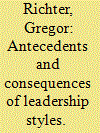

|
|
|
|
|
| Summary/Abstract |
There are numerous studies on the success of various leadership styles that refer to the link between styles and levels of performance and other relevant organizational parameters. Data from a recent survey in a multinational headquarters (HQs) replicate previous findings on leadership style concerning the preferences of the subordinates for more participation in decision-making. Although multinational HQs are in many ways unique organizations that could present unique leadership challenges, too, the findings using traditional models of leadership show how similarly, compared to civilian companies and public administrations, leadership styles are perceived and evaluated by subordinates. Apart from that, the survey data indicate that leadership style—quite different from what was expected—has no significant effect on “organizational commitment” and “mission clarity.” The reasons for that result are discussed against the backdrop of the peculiarities of the organization under investigation.
|
|
|
|
|
|
|
|
|
|
|
|
|
|
|
|
| 2 |
ID:
189922
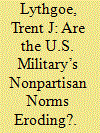

|
|
|
|
|
| Summary/Abstract |
The U.S. military’s nonpartisan norms are an important part of healthy civil–military relations. Some research, however, suggest these norms are weakening. This study examines the evidence for eroding nonpartisan norms by analyzing U.S. military servicemembers’ partisan affiliations and political activism levels from 2008 to 2018. It finds that since 2008, military servicemembers have become more likely to identify as partisans. Servicemembers have also become more politically active than civilians, although this is due to decreasing activism among the American public. It also finds that longer-serving service members have stronger nonpartisan norms, but that newer servicemembers are more politically active than both longer-serving servicemembers and civilians. These findings provide a firmer empirical foundation for previous claims of eroding norms and suggest more research is needed to understand how increased partisanship and political activism impacts military readiness and civil–military relations.
|
|
|
|
|
|
|
|
|
|
|
|
|
|
|
|
| 3 |
ID:
185256


|
|
|
|
|
| Summary/Abstract |
The military environment presents an intersection between a setting featuring unavoidable risk and individual risk-taking propensity; prior work suggests risk-takers have positive and negative outcomes here, and messaging about risk-taking in the military is mixed. The current study used social identity theory to examine how self-reported risk propensity related to three identities/outcomes among cadets at the U.S. Military Academy: attributes of an archetypal “Model Soldier” (physical and military excellence), “Model Student” (grade point average, service positions, and behavior), and Military Values (bravery, duty, and resilience). Structural equation modeling demonstrated that risk-taking was positively related to our Model Soldier and Military Values identities but negatively associated with being a Model Student. Additionally, high-risk-taking cadets were viewed by peers and instructors as confident but prone to judgment, self-discipline, and insight difficulties, suggesting overconfidence among risk-takers. Quantified as a difference between confidence and self-discipline, judgment, and insight, overconfidence mediated the relationship between risk-taking and the three identities, suggesting overconfidence drives both positive and negative associations with risk-taking. Military and leadership implications are presented.
|
|
|
|
|
|
|
|
|
|
|
|
|
|
|
|
| 4 |
ID:
187110
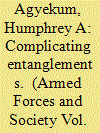

|
|
|
|
|
| Summary/Abstract |
Scholarly debates on civil–military relations often focus on how the military impacts society. Adding to the vast literature of civil–military relations, this article examines how socio-cultural practices and societal developments in the host society affect the military. Based on long-term ethnographic engagement with the Ghana Armed Forces, the piece presents empirical observations of how culturally informed practices, such as begging via proxies (djuan toa), infiltrate the Ghanaian military barracks and affect the institutions’ functioning. The article illustrates how two additional elements, skewed recruitment practices and the politicisation of the rank and file, are used as tools by political factions, such as Ghana’s two most prominent parties (the New Patriotic Party and National Democratic Congress), seeking to gain control over the Ghanaian military. The article analyses how these approaches contribute to undermining the armed forces’ discipline and military professionalism and consequently affect the military institution as a whole.
|
|
|
|
|
|
|
|
|
|
|
|
|
|
|
|
| 5 |
ID:
181159
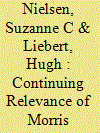

|
|
|
|
|
| Summary/Abstract |
In the current strategic environment, Morris Janowitz’s The Professional Soldier deserves renewed emphasis, especially from the military’s senior leaders who are responsible for the education and development of the country’s officer corps. Janowitz’s work is an especially valuable guide to the education of officers today because of his focus on the need for military officers to understand the political impact of military posture and military operations. The education of U.S. military officers to meet the country’s national security needs in the 21st century must go beyond Huntington’s formulation of expertise to an appreciation, in Janowitz’s terms, of “the political and social impact of the military establishment on international security affairs” across the spectrum of conflict. Janowitz’s formulation is the better guide because military means serve political purposes, and ultimately, a country’s strategic success will be judged in political terms.
|
|
|
|
|
|
|
|
|
|
|
|
|
|
|
|
| 6 |
ID:
186342
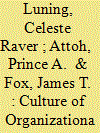

|
|
|
|
|
| Summary/Abstract |
With the backdrop of the utility of grit at the individual level, speculation has begun to circulate that grit may exist as an organizational level phenomenon. To explore this potential construct, this study used an exploratory, qualitative research design. This study explored grit at the organizational level by interviewing leaders’ perceptions of what may be a culture of organizational grit. Participants included 14 U.S. military officers. Seven themes emerged relative to the research question: “What do U.S. military officers perceive as a culture of organizational grit?” Themes included professional pride, team unity, resilience-determination, mission accomplishment, core values, growth mindset, and deliberate practice. This study indicated that a culture of organizational grit is likely a combination of converging organizational elements. Overall, findings indicate that there may be a culture of organizational grit in the military and at the least, more research examining the concept is warranted.
|
|
|
|
|
|
|
|
|
|
|
|
|
|
|
|
| 7 |
ID:
173120


|
|
|
|
|
| Summary/Abstract |
Our research, based on a sample of 500 veterans currently studying at Israeli colleges and universities, suggests that certain aspects of military service are associated with greater entrepreneurial intentions. Specifically, the desire to engage in entrepreneurship is higher among veterans with command experience than veterans without. Similarly, veterans of technological units generally express greater entrepreneurial interest than veterans of combat units. A comparison of commissioned and noncommissioned officers yields curious results and offers a possible direction for further investigation. Although Israel is among the few countries that maintains a mandatory draft, the general applicability of these findings to countries with volunteer forces is discussed.
|
|
|
|
|
|
|
|
|
|
|
|
|
|
|
|
| 8 |
ID:
189919
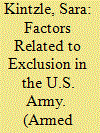

|
|
|
|
|
| Summary/Abstract |
The promotion of inclusion in the U.S. Army requires an understanding of how and why exclusion occurs. As exclusion can have deleterious impacts at both and individual and organizational level, reducing exclusive behaviors can have positive effects on Soldiers and the Army. To explore exclusion in the Army, 19 focus groups were conducted with 120 active-duty enlisted Soldiers. Two rounds of thematic analysis revealed four themes related to exclusion. Participants indicated exclusion to be often based on low or bad performance, personality factors that were identified as different or toxic, cliques within the Army unwilling to welcome others, and gender, with both men and women identifying exclusionary behaviors toward women within and outside of the work environment. Research findings offer insight into how and why exclusion occurs and how such behaviors can be addressed in the U.S. Army including training and addressing cultural and systemic barriers to inclusion.
|
|
|
|
|
|
|
|
|
|
|
|
|
|
|
|
| 9 |
ID:
190782
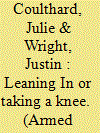

|
|
|
|
|
| Summary/Abstract |
Less research has examined the extent to which external contexts and factors that influence an organizational member’s life choices also influence their career trajectories within the military, and particularly among those who advance to leadership positions at the General Officer/Flag Officer level. Interviews were conducted with 20 select General Officer/Flag Officers in the Canadian Armed Forces. As part of a secondary analysis of an exploratory qualitative study, we applied a Life Course Theory lens to better understand the intersections between the sociohistorical and cultural context of senior leader development, and the individual choices that the participants made that led to their ascent to their rank. This study provides insight into how the historical time and place, the timing in their lives, the linked lives they share with family, and the degree of agency they maintained over their life choices led participants to “lean in” rather than “take a knee.”
|
|
|
|
|
|
|
|
|
|
|
|
|
|
|
|
| 10 |
ID:
151013
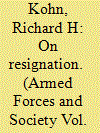

|
|
|
|
|
| Summary/Abstract |
Arguments in favor of the topmost senior officers exercising “principled resignation” in opposition to policies, decisions, or orders that they find immoral, unethical, or disastrous for the country weaken the military profession and endanger American national security. A member of the Joint Chiefs, a combatant commander, or a topmost war commander who “resigns” would be injecting themselves improperly into a policy role, opposing civilian authority, and undermining civilian control of the military. The act would be politicizing for the military and likely fail to change what the officer opposes. Most importantly, their act of personal conscience would poison civil–military relations long into the future; civilian trust in military subordinates not to undermine support for policies and decisions with the public and other political leaders would decline. Even more than today, they would choose their senior military leaders for compatibility and agreement above other traits.
|
|
|
|
|
|
|
|
|
|
|
|
|
|
|
|
| 11 |
ID:
183835
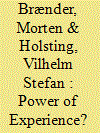

|
|
|
|
|
| Summary/Abstract |
Traditionally, the military is seen as an unequivocally authoritarian organization. With survey data collected at the Royal Danish Military Academy, this study shows that that is a qualified truth. Thus, cadets enrolled directly from the noncommissioned officer corps—those most acquainted with the norms of the armed forces—do not weigh authoritarian leadership values over nonauthoritarian ones. Instead, their view reflects that for the experienced leader, the context, and not overt ideals, enables them to choose the leadership tools they expect will prove most effective. On the contrary, cadets enrolled based on their civilian merits clearly prioritize authoritarian values. This is particularly true among cadets returning to the military after a break, former professionals, and former draftees alike. Their view also reflects experience, but a different kind of experience, as they have primarily encountered the military hierarchy from the receiving end.
|
|
|
|
|
|
|
|
|
|
|
|
|
|
|
|
| 12 |
ID:
151011
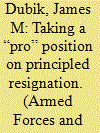

|
|
|
|
|
| Summary/Abstract |
Principled resignation of senior military officers is sometimes justified, especially in wartime. First, except under very narrow circumstances, each of us remains a moral agent. Second, American’s hold those on the battlefield responsible for their decisions and actions, and we must hold senior generals and admirals responsible for strategic decisions and actions taken in capitals. Third, organizations—regardless of type—incur significant risks when senior officials remain silent in the face of serious wrongs. Finally, war risks, damages, changes, and often ends lives of the innocent, of the citizens who fight on behalf of their nation, and of the political community itself, even if the war does not involve an existential threat. Although my colleagues, with companion pieces in this journal, disagree, senior leaders who participate in strategic, war-waging decisions and actions are responsible to speak out, perhaps even to to leave, when the risk involves not just effectiveness but using poorly or wasting life.
|
|
|
|
|
|
|
|
|
|
|
|
|
|
|
|
| 13 |
ID:
181156
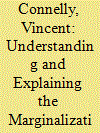

|
|
|
|
|
| Summary/Abstract |
Recent changes in the British Army mean part-time reservists and full-time regulars need to become better integrated. However, there has been a long history of workplace tensions between the full-time and part-time elements in the British Army. This mirrors those found in many civilian workplaces. Focus group data with 105 full-time regular British Army soldiers confirmed that time and emotional commitment are strongly linked in a full-time professional workplace that has strong, definite, and enduring boundaries. This, alongside demands for conformity and stratification by rank explained the high risk of marginalization of part-time reservists. The legitimacy of part-time reservists, especially in the combat arms, was often challenged. Using this explanatory framework, some implications and practical ways that tensions may be reduced between full-time and part-time members of the British Army, and other armed forces facing similar tensions, were highlighted.
|
|
|
|
|
|
|
|
|
|
|
|
|
|
|
|
| 14 |
ID:
177001
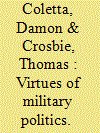

|
|
|
|
|
| Summary/Abstract |
Sociologists and political scientists have long fretted over the dangers that a politicized military poses to democracy. In recent times, however, civil–military relations experts in the United States accepted retired or indeed still serving generals and admirals in high-ranking political posts. Despite customary revulsion from scholars, the sudden waivers are an indicator that military participation in momentous national security decisions is inherently political without necessarily being partisan, including when civilian authority defers to a largely autonomous sphere for objective military expertise. Military politics is actually critical for healthy civil–military collaboration, when done prudently and moderately. Janowitz and Huntington, founders of the modern study of civil–military relations, understood the U.S. military’s inevitable invitation to political influence. Here, we elaborate on two neglected dimensions, implicit in their projects, of military politics under objective civilian control based on classical virtues of civic republicanism: Aristotle’s practical wisdom and Machiavelli’s virtú.
|
|
|
|
|
|
|
|
|
|
|
|
|
|
|
|
|
|
|
|
|